A Year of Homework Club
Our Homework & Activities Club (which is part of our Love to Learn education programme) has worked with refugee young people for more than 15 years. Here’s a round up of what we’ve achieved over the last year (2019/20).
The refugee young people we work with are substantially behind at every educational Key Stage, which can result in low attainment levels, challenging behaviour, risk of exclusion and restricted opportunities in life/employment. To enable them to thrive in education we run a number of Homework & Activity Clubs including: Junior Club (5-10 year olds), Senior Club (10-15s), GCSE Study Groups (15-16s) and Holiday Clubs (5-18s).
Last year we supported 86 refugee young people and their families with:
- Weekly term-time clubs are an hour of educational support and an hour of informal learning activities such as drama, sports, music, arts & craft and cookery. We recruit and train volunteers, and work in partnership with local organisations to provide high quality activities.
- GCSE study groups are supported by an experienced tutor and adult volunteers (many are teachers), and enable under-achievers with high potential to boost their learning and achieve the grades they need to take the next steps in their education.
- Due to staff changes, and now Coronavirus, we have not yet started our new Youth Club. We have conducted the feasibility, have a plan, and were due to start after Easter’20. We are trialling this online shortly. The Club responds to a need for a safe space trusted by parents/carers and refugee young people, at the key time of leaving school and the care system, transitioning and high vulnerability to dropping out and gangs.
- Holiday activities, particularly over the summer holidays, are a highlight and include visits to the seaside, museums, camping, rock-climbing and art classes. During summer’19 we supported 424 young people in 15 events/activities – click here for the summer report.
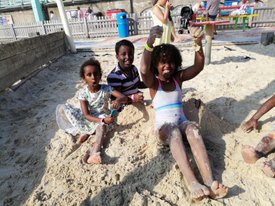
Our Clubs work to achieve three main outcomes for refugee young people.
Outcome 1: Improved confidence in the children that attend the homework club
This year we have welcomed 12 children who have very recently arrived in the UK from war torn countries like Syria. Due to the severe trauma they have been through, the lack of any formal education, as well as the difficulties they face adapting to a new country, they have struggled at school. When they started to attend Club they were often disruptive, manic and extremely emotional. In order to best support them we made sure they always felt welcome. We paired them with experienced volunteers. We encouraged friendships through befriender pairs. We made learning resources specific to their needs. We made sure we ran activities they enjoyed, and invited their parents to stay until the children felt comfortable. In the past 3 months we have seen a significant improvement in their confidence and general happiness. They now fully engage with all the activities we run and have made good relationships.
We had a number of young people at our Seniors Club who, at the beginning of the year, struggled with their self-esteem and confidence. This meant they found relationships difficult especially at school. Throughout the year we have developed group workshops and activities to help them make friends, reduce social isolation, and feel supported and hopeful for the future. For example, we taught them a range of coping tools to manage stress, anxiety and anger, and to talk about the things that are troubling them if they wish. We invited a range of professionals to run workshops, including people from an international tech/website company and someone from UK parliament, to raise awareness of future opportunities as well as confidence in engaging with different people.
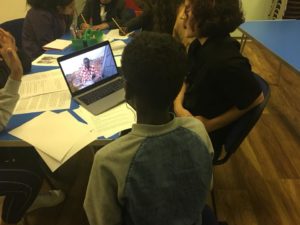
For the most vulnerable young people, Club staff have regular meetings to review their progress and have individual plans for particular children. If a child struggles with a particular issue, we provide 1:1 support so they can talk through the issues with an adult, reflect and try to come up with their own solutions.
We work closely with parents, meeting with them regularly and doing home visits when necessary. We also refer particular cases to our colleagues in our family support casework team. This year, Nadine our Clubs Manager, with one of our caseworkers, has accompanied and advocated for five families on issues such as exclusions, challenging behaviour and Special Educational Needs. This intensive service is provided for those who need it most, but is open to all.
We ran music, football, art, cookery and table tennis sessions as requested by the young people. The aim of these sessions is to increase confidence, have fun, learn new skills, try new things and feel confident with new people.
We have over 40 volunteers. They are from a variety of professional and cultural backgrounds: MA students, teachers, retired social workers, civil servants, scientists, business people etc. Getting to know the volunteers broadens the children’s horizons and their confidence with relating to people from diverse backgrounds and with completely different life experiences to them.
Outcome 2: Children’s improved relationships with adults and other young people
At the beginning of the year all the refugee young people we worked with displayed difficulty with relationships and interactions with others.
We carefully match children with volunteers that we feel they will work best with and can build a strong relationship with. Our volunteers come from a variety of backgrounds and often act as role models. 12 of our refugee young people are newly-arrived in the UK (within 12 months). For them, Club is a safe place to improve their English and make friends outside the sometimes-stressful setting of school. Staff observations have demonstrated that all the newly-arrived young people have settled into Club quickly, made friends and interacted well with adults. They have fed back that it is helpful to be practising English in an informal environment and with adults from a wide range of backgrounds.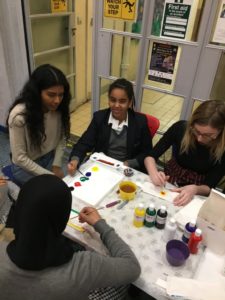
Activities at Club are specifically designed to support all the young people in developing personal skills – e.g. increasing creativity, imagination through arts activities. We especially work on developing communication and social skills through game play, drama games and team challenges. Young people find this process very challenging, and have to be encouraged to work together, which has improved their interpersonal skills.
With the junior group we ran a term of regular group story-telling workshops. These sessions were very popular and improved team work and relationships in the group. We encourage the children and adult volunteers to praise each other, as positive feedback from peers is unusual and valuable. We have tracked progress in log books that are completed with staff or volunteers.
Cooking and gardening activities in groups also provide an excellent way to learn to negotiate and work together. Our ‘Wednesday Club Bake Off’ and ‘Master Chef’ competitions have been very popular!
New experiences
A high percentage of our young people have limited life experiences (e.g. have never been to the cinema, beach, museum, cycling etc.) – our project provides these experiences. All the young people have been on at least 5 trips with us in the past year. Feedback tells us that they increase students’ personal skills, independence, and in particular their relationships and confidence with others. We have organised for experienced volunteers to take some of our most vulnerable and isolated children on day trips to the farm, park, cinema. This gives the children opportunities they would otherwise not have, as well as time and attention from an adult, which really improves their confidence and strengthens their relationship with adults.
Children have the chance to mix with other young people from different backgrounds they may otherwise not meet. They make strong friendships. The safe environment, we try to create, supports them to deal with any conflict openly, and manage relationships is a way they otherwise may not have been able to do. We have children from six different nationalities attend the clubs.
Outcome 3: Children are willing to engage with reading and writing
Children who attend our clubs are all from refugee backgrounds and experience significant barriers to learning (e.g. parents speak little English and may not understand UK school system, nowhere to study at home, larger families, poverty etc.).
We are continuously monitoring the children’s individual literacy and numeracy learning needs. We have developed activities and materials which enable them to improve and grow. Each week all the children are helped to complete their homework with an adult, either 1:1 or in small groups of 3 children and 1 adult. Parents and teachers have told us that these children often do not complete homework at home because they do not have access to support or resources (computers, internet, craft materials, books, pens etc.).
Reading rules
This year we have continued to prioritise reading and at the beginning of every homework session each child either reads to an adult or is read to. We run regular activities to encourage reading and writing such as a winter reading challenge, book quizzes with prizes, storytelling competitions etc. We made sure we have engaging and relevant resources. We regularly get feedback and suggestions from the children and volunteers as to what books/magazines etc they would like to have at Club.
We meet and speak regularly with all the children’s parents so we are up to date with how they are doing at school and can make sure we support them with the particular areas they are struggling with. For example, we have worked closely with colleagues that run ESOL (English) classes to develop a wide range of resources particularly to support those new to English.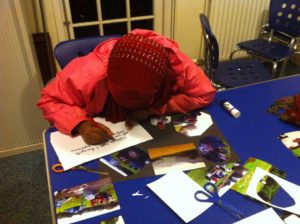
We have found a real increase in the children’s interest in reading and wanting to take books home and read out loud with an adult. For those that struggle with reading, and are well below their peers, responded well to small ‘storytelling’ groups, where an adult reads a story and then the group discuss it. With time these children have asked if they can read to the group, which is an enormous leap in their reading ability, their confidence and interest in reading.
We took ten families on a trip to the local library when they were running a family event. This was a real positive experience. Although the library is very local to where all the families live none of them had ever visited. They all told us that they now regularly go to the library.
During World Book Day, we ran a number of activities e.g. volunteers brought in their favourite book from childhood to share with the group, book quizzes and competitions. All the children and adults had a lot of fun.
Those that have not or are starting to show progress have particularly complex needs and have been out of school for a number of months due to permanent exclusion or places not being available. We have matched them with volunteers and are working on increasing their confidence and motivation to learn.
Additional Outcomes
At the beginning of the year 96% of those who attend told us that they do not take part in any other activity outside of school, apart from religious studies. As a result of this finding we worked with individual children to engage them with other local social activities that they were interested in. For example, we invited workshop leaders who were starting a new Brownies club in our building to come to three clubs to meet children and parents. 7 girls now attend their weekly clubs. We also worked with a local skateboarding club who offered 4 places to our young people at a very discounted rate. 4 young people go to a weekly multi-sports club which we supported them to attend by escorting them to their first two sessions.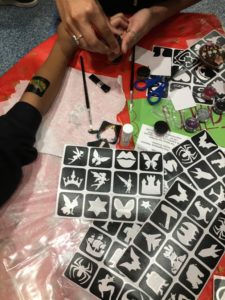
We have observed young people who attend trips and activities spend lots of time laughing, learning and joking – who tell us that at home they would be watching TV, playing computer games, ‘being bored’ or ‘fighting with my family’ – our positive activities make a real difference to wellbeing – a chance to run and paddle on the beach, swim in a lake, sleep outside and cook their own food – a 6-year-old child on a farm visit said ‘I wish we could stay here forever’. We have also provided family trips so that young people can enjoy quality time with parents and siblings and build up some happy family memories.
What next?
The Coronavirus lockdown has transformed our Clubs and we now deliver them via Zoom, WhatsApp, over the phone and using the post. But more about this in another post.
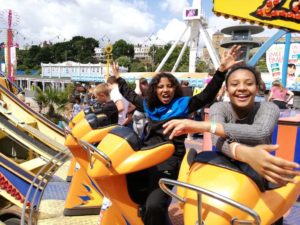
Finally, we thought you might be interested in reading about one young person who comes to Club, Saadia, and the difference we’ve made to her life and education.
Case Study: Supporting a young person and their family
Saadia has been attending our homework clubs since she was 8. She is now 13. She lives with her 5 siblings, her mother and step-father in an overcrowded flat. Her parents work long hours in low income jobs, have large debts and struggle to meet the family’s basic needs. Her mother has had depression for many years and is often emotionally unavailable to her children. Saadia takes on a lot of caring responsibilities for her younger siblings as her eldest brother is in and out of prison and her elder sister suffers with mental illness and was recently sectioned.
Saadia has always struggled at school, particularly with her behaviour. However, this has come to a head at her secondary school where she is continuously being put in ‘isolation’ to work on her own or suspended for at least a day per week. Her behaviour can be extremely disruptive at the club and she has been bullying other younger members.
The Club’s Manager, Nadine, has been providing Saadia with one-to-one emotional support. She has been visiting her at home to build a strong relationship with her family and provide support to her mother who is struggling to cope with her children’s needs. At the Club staff and volunteers have observed that SA does not engage at all with her school work and finds any excuse to avoid it. She is unable to concentrate on a task for more than a couple of minutes and becomes angry and disruptive towards others that are able to do their work.
Nadine has been working closely with our Love to Learn Casework Manager (Elaine) who supports Saadia’s mother with her debt issues and her other children’s needs. Nadine and the case worker have attended numerous school meetings. During the meetings school staff repeatedly insisted that Saadia chose to be disruptive and just needed to adhere to the school’s rules in order to remain at the school. The school’s Vice-Principal decided that if her behaviour did not improve she would be permanently excluded. Nadine and the case worker insisted Saadia was referred to the school’s educational psychologist and SEN department for further assessment and support. This was reluctantly accepted but due to limited resources took months to happen. In the meantime, a CAMHS referral was made by the Love to Learn staff and it was found that Saadia has a severe cognitive learning disability and her cognitions are similar to those of a 6-year-old.
As a result, Saadia was given the SEN support she requires to take part in school and will be, as advised by CAMHS, starting at a specialist school in the next month.
Throughout the year we have also arranged for Saadia to go on some recreational activities with a volunteer at the weekends. Her family attended all our summer activities and Saadia was given a place at weekly skateboarding workshops which is something she loves. Saaida’s mother has also been attending local parenting workshops.
Names have been changed to ensure anonymity.
Contact
If you’d like to contact our Homework Club please call 020 7585 0339 and email [email protected]